What are you looking for at Aqrani library?
-
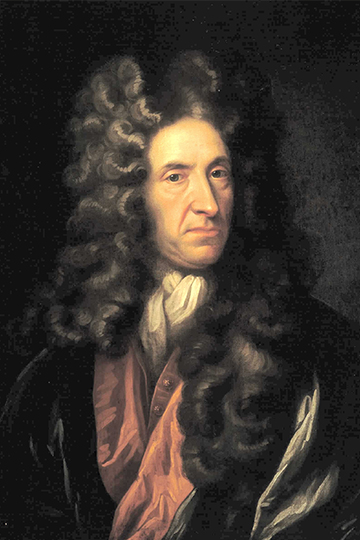
Daniel Defoe
Daniel Defoe (born 1661 – 24 April 1731), born Daniel Foe, was an English trader, writer, journalist, pamphleteer and spy. He is most famous for his novel Robinson Crusoe, published in 1719, which is claimed to be second only to the Bible in its number of translations. He has been seen as one of the earliest proponents of the English novel, and helped to popularise the form in Britain with others such as Aphra Behn and Samuel Richardson. Defoe wrote many political tracts and was often in trouble with the authorities, and spent a period in prison. Intellectuals and political leaders paid attention to his fresh ideas and sometimes consulted with him.Defoe was a prolific and versatile writer, producing more than three hundred works books, pamphlets, and journals—on diverse topics, including politics, crime, religion, marriage, psychology, and the supernatural. He was also a pioneer of business journalism and economic journalism. Defoe died on 24 April 1731.
-
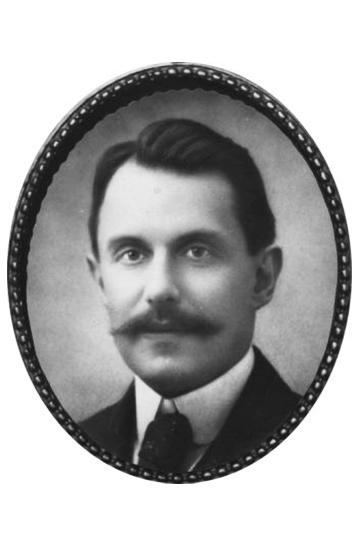
Frédéric Delly
M. Delly or Delly was the pseudonym of the couple of French brothers Jeanne Marie Henriette Petitjean de la Rosiére (Avignon, 1875 - Versailles, 1947) and Frédéric Henri Petitjean de la Rosiére (Vannes, 1870 - Versailles, 1949).Jeanne-Marie and Frédéric were the children of a soldier, Ernest Petitjean, and his wife, Charlotte Gaultier de La Rosière, whose name they took again. They spent their childhood in Vannes before moving to Versailles, after the retirement of their father. In this city, they became friends with their neighbours, the family of Commander Brunot whose wife Marie would become, a few years later, the author of children’s books Marie d'Agon de de la Contrie. Marie, a young dreamer who devoted her entire life to writing, was at the origin of a superabundant work whose publication began in 1903 with Dans les ruines. The contribution of Frédéric is less known in writing than in the skilful management of publishing contracts, several companies sharing this author who was systematically successful. The rate of publication, from several novels a year until 1925, and the very good sales figures ensured the siblings a comfortable income. They did not prevent the two authors from living in perfect discretion, until they remained unknown to the general public and criticism. The identity of Delly was not revealed until Jeanne-Marie’s death on April 1, 1947, two years before that of her brother. They are buried in the cemetery of Notre-Dame de Versailles.Marie and Frédéric Petitjean bequeath part of their fortune and all their manuscripts to the Société des gens de lettres to help the sick or needy writers (Delly scholarship). A room of the Hotel de Massa, seat of the SGDL, is called Delly room.
-
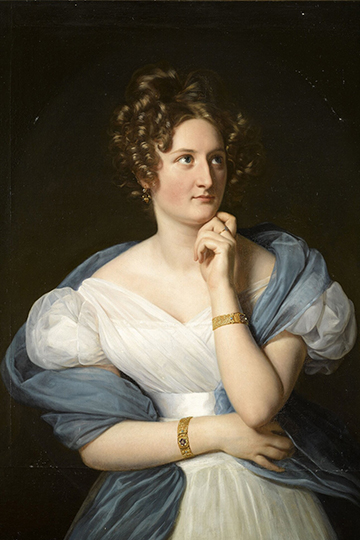
Delphine de Girardin
Delphine de Girardin (24 January 1804 – 29 June 1855), pen name Vicomte Delaunay, was a French author. de Girardin was born at Aachen, and christened Delphine Gay. Her mother, the well-known Madame Sophie Gay, brought her up in the midst of a brilliant literary society. Her cousin was the writer Hortense Allart. Gay published two volumes of miscellanea, Essais poetiques (1824) and Nouveaux Essais poétiques (1825). A visit to Italy in 1827, during which she was enthusiastically welcomed by the literati of Rome and even crowned in the capitol, produced various poems, of which the most ambitious was Napoline (1833).Gay's marriage in 1831 to Émile de Girardin opened up a new literary career. The contemporary sketches which she contributed from 1836 to 1839 to the La Presse, under the nom de plume of Charles de Launay, were collected under the title of Lettres parisiennes (1843), and obtained a brilliant success. La Canne de Monsieur de Balzac (1836) and Il ne faut pas jouer avec la douleur (1853) are among the best-known of her romances.
-
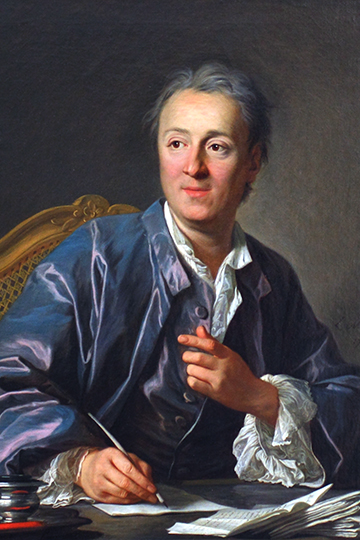
Denis Diderot
Denis Diderot (French: [dəni did(ə)ʁo], 5 October 1713 – 31 July 1784) was a French philosopher, art critic, and writer, best known for serving as co-founder, chief editor, and contributor to the Encyclopédie along with Jean le Rond d'Alembert. He was a prominent figure during the Age of Enlightenment.Diderot initially studied philosophy at a Jesuit college, then considered working in the church clergy before briefly studying law. When he decided to become a writer in 1734, his father disowned him. He lived a bohemian existence for the next decade. In the 1740s he wrote many of his best-known works in both fiction and non-fiction, including the 1748 novel The Indiscreet Jewels.In 1751, Diderot co-created the Encyclopédie with Jean le Rond d'Alembert. It was the first encyclopedia to include contributions from many named contributors and the first to describe the mechanical arts. Its secular tone, which included articles skeptical about Biblical miracles, angered both religious and government authorities, in 1758 it was banned by the Catholic Church and in 1759 the French government banned it as well, although this ban was not strictly enforced. Many of the initial contributors to the Encyclopédie left the project as a result of its controversies and some were even jailed.
-

Didier Meral
Books : Small Dictionary of Rare and Ancient Words of the French Language
-
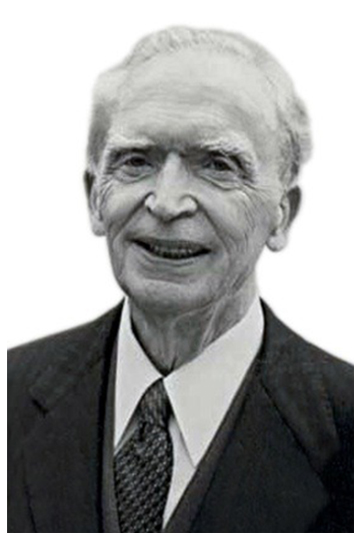
Dr Joseph Murphy
Joseph Denis Murphy (May 20, 1898 – December 16, 1981) was an Irish-born American author and New Thought minister, ordained in Divine Science and Religious Science. Murphy was born in Ballydehob, County Cork, Ireland, the son of a private boys' school headmaster and raised a Roman Catholic. He joined the Jesuits. Murphy was enrolled in the National School and was encouraged to study for the priesthood and was accepted as a Jesuit seminarian. However, by the time he reached his late teen years, he began to question the Catholic orthodoxy of the Jesuits, and he withdrew from the seminary. His goal was to explore new ideas and gain new experiences—a goal he could not pursue in Catholic-dominated Ireland—he left his family to go to America. In his twenties, before being ordained a priest, an experience with healing prayer led him to leave the Jesuits and emigrate to the United States in 1922, he journeyed as a steerage passenger on board the RMS Cedric, sailing from Liverpool, England, to the Port of New York, on the ship's passenger manifest, his occupation was listed as chemist, the British term for pharmacist. He became a professional pharmacist in New York City (having a degree in chemistry by that time). Here he attended the Church of the Healing Christ (part of the Church of Divine Science), where Emmet Fox had become minister in 1931.
-
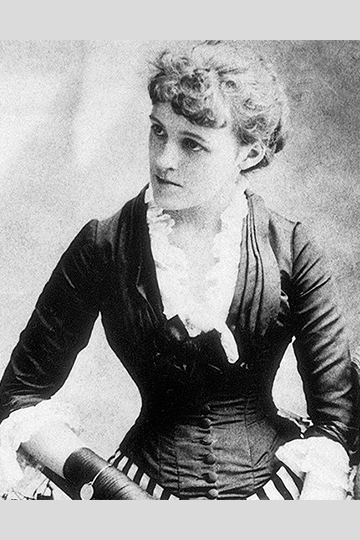
Edith Wharton
Edith Wharton ( born Edith Newbold Jones January 24, 1862 – August 11, 1937) was an American novelist, short story writer, and designer. Wharton drew upon her insider's knowledge of the upper class New York "aristocracy" to realistically portray the lives and morals of the Gilded Age. In 1921, she became the first woman to win the Pulitzer Prize in Literature, for her novel The Age of Innocence.
-
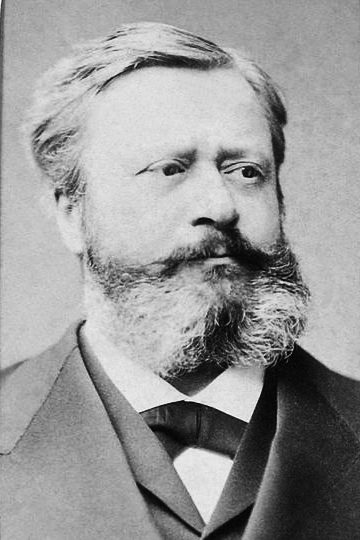
Edmond About
Edmond François Valentin About (14 February 1828 – 16 January 1885) was a French novelist, publicist and journalist. About was born at Dieuze, in the Moselle département in the Lorraine region of France. In 1848 he entered the École Normale, taking second place in the annual competition for admission in which Hippolyte Taine came first. Among his college contemporaries, besides Taine, were Francisque Sarcey, Challemel-Lacour and Prevost-Paradol. Of them all, About was considered the most highly vitalized, exuberant, brilliant and "undisciplined".. It is said that one of his schoolmasters told him "You will never be more than a little Voltaire,". and About's career did tend toward Voltaire-style witty satire and commentaries on contemporary issues.At the end of his college career, he joined the French school in Athens, but claimed that he had never intended to follow the professorial career for which the École Normale was a preparation, and in 1853 he returned to France and devoted himself to literature and journalism.
-
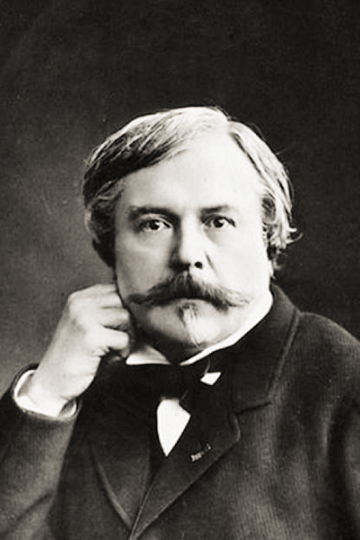
Edmond de Goncourt
Edmond Louis Antoine Huot de Goncourt ( 26 May 1822 – 16 July 1896) was a French writer, literary critic, art critic, book publisher and the founder of the Académie Goncourt. Goncourt was born in Nancy. For much of his life, he collaborated with his brother Jules creating works of art criticism, a notorious journal, and subsequently several novels. He was known to be fascinated with Rococo and Japanese art. He also collected rare books. After the death of Jules he continued to write novels alone.He bequeathed his entire estate for the foundation and maintenance of the Académie Goncourt. In honour of his brother and collaborator, Jules de Goncourt (17 December 1830 – 20 June 1870), each December since 1903, the Académie awards the Prix Goncourt. It is the most prestigious prize in French language literature, given to "the best imaginary prose work of the year".Marcel Proust, Simone de Beauvoir, Michel Tournier, Marguerite Duras, Romain Gary (who exceptionally won it twice) and Nobel laureate Patrick Modiano are among the authors who have won the prize.Edmond de Goncourt died in Champrosay in 1896, and was interred in the Cimetière de Montmartre in Paris.
-
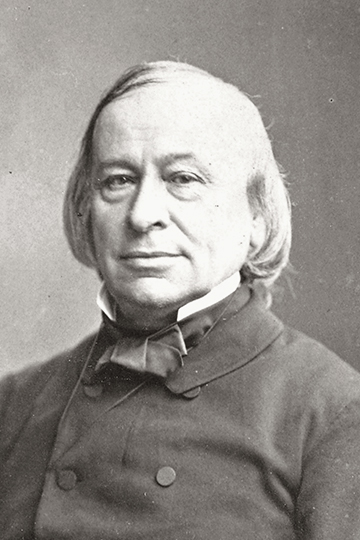
Édouard Laboulaye
Édouard René Lefèbvre de Laboulaye ( 18 January 1811 – 25 May 1883) was a French jurist, poet, author and anti-slavery activist. In 1865, he originated the idea of a monument presented by the French people to the United States that resulted in the Statue of Liberty in New York Harbor. He got the idea thinking that this would help strengthen their relationship with the United States.Laboulaye was received at the bar in 1842, and was chosen professor of comparative law at the Collège de France in 1849. Following the Paris Commune of 1870, he was elected to the national assembly, representing the departement of the Seine. As secretary of the committee of thirty on the constitution he was effective in combatting the Monarchists in establishing the Third Republic. In 1875, he was elected a life senator, and in 1876 he was appointed administrator of the Collège de France, resuming his lectures on comparative legislation in 1877. Laboulaye was also chairman of the French Anti-Slavery Society. Laboulaye was president of the Société d'économie politique.